- Home
- Robert E. Howard
Conan the Barbarian: The Chronicles of Conan (collected short stories) Page 20
Conan the Barbarian: The Chronicles of Conan (collected short stories) Read online
Page 20
Murilo cursed, an icy hand playing up and down his spine. He might have known Nabonidus would not leave any entrance into his house unguarded. Had Conan not possessed the steel-spring quickness of a wild thing, that falling portcullis would have skewered him. Doubtless his walking through the tunnel had sprung some hidden catch that released it from the roof. As it was, both were trapped living.
“There's but one thing to do,” said Murilo, sweating profusely. “That's to search for some other exit; doubtless they're all set with traps, but we have no other choice.”
The barbarian grunted agreement, and the companions began groping their way at random down the corridor. Even at that moment, something occurred to Murilo.
“How did you recognize me in this blackness?” he demanded.
“I smelled the perfume you put on your hair, when you came to my cell,” answered Conan. “I smelled it again a while ago, when I was crouching in the dark and preparing to rip you open.”
Murilo put a lock of his black hair to his nostrils; even so the scent was barely apparent to his civilized senses, and he realized how keen must be the organs of the barbarian.
Instinctively his hand went to his scabbard as they groped onward, and he cursed to find it empty. At that moment a faint glow became apparent ahead of them, and presently they came to a sharp bend in the corridor, about which the light filtered grayly. Together they peered around the corner, and Murilo, leaning against his companion, felt his huge frame stiffen. The young nobleman had also seen it — the body of a man, half naked, lying limply in the corridor beyond the bend, vaguely illumined by a radiance which seemed to emanate from a broad silver disk on the farther wall. A strange familiarity about the recumbent figure, which lay face down, stirred Murilo with inexplicable and monstrous conjectures. Motioning the Cimmerian to follow him, he stole forward and bent above the body. Overcoming a certain repugnance, he grasped it and turned it on its back. An incredulous oath escaped him; the Cimmerian grunted explosively.
“Nabonidus! The Red Priest!” ejaculated Murilo, his brain a dizzy vortex of whirling amazement. “Then who — what — ?”
The priest groaned and stirred. With catlike quickness Conan bent over him, poniard poised above his heart. Murilo caught his wrist.
“Wait! Don't kill him yet—”
“Why not?” demanded the Cimmerian. “He has cast off his were-guise, and sleeps. Will you awaken him to tear us to pieces?”
“No, wait!” urged Murilo, trying to collect his jumbled wits. “Look! He is not sleeping — see that great blue welt on his shaven temple? He has been knocked senseless. He may have been lying here for hours.”
“I thought you swore you saw him in beastly shape in the house above,” said Conan.
“I did! Or else — he's coming to! Keep back your blade, Conan; there is a mystery here even darker than I thought. I must have words with this priest, before we kill him.”
Nabonidus lifted a hand vaguely to his bruised temple, mumbled, and opened his eyes. For an instant they were blank and empty of intelligence; then life came back to them with a jerk, and he sat up, staring at the companions. Whatever terrific jolt had temporarily addled his razor-keen brain, it was functioning with its accustomed vigor again. His eyes shot swiftly about him, then came back to rest on Murilo's face.
“You honor my poor house, young sir,” he laughed coolly, glancing at the great figure that loomed behind the young nobleman's shoulder. “You have brought a bravo, I see. Was your sword not sufficient to sever the life of my humble self?”
“Enough of this,” impatiently returned Murilo. “How long have you lain here?”
“A peculiar question to put to a man just recovering consciousness,” answered the priest. “I do not know what time it now is. But it lacked an hour or so of midnight when I was set upon.”
“Then who is it that masquerades in your own gown in the house above?” demanded Murilo.
“That will be Thak,” answered Nabonidus, ruefully fingering his bruises. “Yes, that will be Thak. And in my own gown? The dog!”
Conan, who comprehended none of this, stirred restlessly, and growled something in his own tongue. Nabonidus glanced at him whimsically.
“Your bully's knife yearns for my heart, Murilo,” he said. “I thought you might be wise enough to take my warning and leave the city.”
“How was I to know that was to be granted me?” returned Murilo. “At any rate, my interests are here.”
“You are in good company with that cutthroat,” murmured Nabonidus. “I had suspected you for some time. That was why I caused that pallid court secretary to disappear. Before he died he told me many things, among others the name of the young nobleman who bribed him to filch state secrets, which the nobleman in turn sold to rival powers. Are you not ashamed of yourself, Murilo, you white-handed thief?”
“I have no more cause for shame than you, you vulture-hearted plunderer,” answered Murilo promptly. “You exploit a whole kingdom for your personal greed; and, under the guise of disinterested statesmanship, you swindle the king, beggar the rich, oppress the poor, and sacrifice the whole future of the nation for your ruthless ambition. You are no more than a fat hog with his snout in the trough. You are a greater thief than I am. This Cimmerian is the most honest man of the three of us, because he steals and murders openly.”
“Well, then, we are all rogues together,” agreed Nabonidus equably. “And what now? My life?”
“When I saw the ear of the secretary that had disappeared, I knew I was doomed,” said Murilo abruptly, “and I believed you would invoke the authority of the king. Was I right?”
“Quite so,” answered the priest. “A court secretary is easy to do away with, but you are a bit too prominent. I had intended telling the king a jest about you in the morning.”
“A jest that would have cost me my head,” muttered Murilo. “Then the king is unaware of my foreign enterprises?”
“As yet,” sighed Nabonidus. “And now, since I see your companion has his knife, I fear that jest will never be told.”
“You should know how to get out of these rat-dens,” said Murilo. “Suppose I agree to spare your life. Will you help us to escape, and swear to keep silent about my thievery?”
“When did a priest keep an oath?” complained Conan, comprehending the trend of the conversation. “Let me cut his throat; I want to see what color his blood is. They say in the Maze that his heart is black, so his blood must be black, too—”
“Be quiet,” whispered Murilo. “If he does not show us the way out of these pits, we may rot here. Well, Nabonidus, what do you say?”
“What does a wolf with his leg in the trap say?” laughed the priest. “I am in your power, and, if we are to escape, we must aid one another. I swear, if we survive this adventure, to forget all your shifty dealings. I swear by the soul of Mitra!”
“I am satisfied,” muttered Murilo. “Even the Red Priest would not break that oath. Now to get out of here. My friend here entered by way of the tunnel, but a grille fell behind him and blocked the way. Can you cause it to be lifted?”
“Not from these pits,” answered the priest. “The control lever is in the chamber above the tunnel. There is only one other way out of these pits, which I will show you. But tell me, how did you come here?”
Murilo told him in a few words, and Nabonidus nodded, rising stiffly. He limped down the corridor, which here widened into a sort of vast chamber, and approached the distant silver disk. As they advanced the light increased, though it never became anything but a dim shadowy radiance. Near the disk they saw a narrow stair leading upward.
“That is the other exit,” said Nabonidus. “And I strongly doubt if the door at the head is bolted. But I have an idea that he who would go through that door had better cut his own throat first. Look into the disk.”
What had seemed a silver plate was in reality a great mirror set in the wall. A confusing system of copperlike tubes jutted out from the wall above it, bending
down toward it at right angles. Glancing into these tubes, Murilo saw a bewildering array of smaller mirrors. He turned his attention to the larger mirror in the wall, and ejaculated in amazement. Peering over his shoulder, Conan grunted.
They seemed to be looking through a broad window into a well-lighted chamber. There were broad mirrors on the walls, with velvet hangings between; there were silken couches, chairs of ebony and ivory, and curtained doorways leading off from the chamber. And before one doorway which was not curtained, sat a bulky black object that contrasted grotesquely with the richness of the chamber.
Murilo felt his blood freeze again as he looked at the horror which seemed to be staring directly into his eyes. Involuntarily he recoiled from the mirror, while Conan thrust his head truculently forward, till his jaws almost touched the surface, growling some threat or defiance in his own barbaric tongue.
“In Mitra's name, Nabonidus,” gasped Murilo, shaken, “what is it?”
“That is Thak,” answered the priest, caressing his temple. “Some would call him an ape, but he is almost as different from a real ape as he is different from a real man. His people dwell far to the east, in the mountains that fringe the eastern frontiers of Zamora. There are not many of them; but, if they are not exterminated, I believe they will become human beings in perhaps a hundred thousand years. They are in the formative stage; they are neither apes, as their remote ancestors were, nor men, as their remote descendants may be. They dwell in the high crags of well-nigh inaccessible mountains, knowing nothing of fire or the making of shelter or garments, or the use of weapons. Yet they have a language of a sort, consisting mainly of grunts and clicks.
“I took Thak when he was a cub, and he learned what I taught him much more swiftly and thoroughly than any true animal could have done. He was at once bodyguard and servant. But I forgot that being partly a man, he could not be submerged into a mere shadow of myself, like a true animal. Apparently his semi-brain retained impressions of hate, resentment, and some sort of bestial ambition of its own.
“At any rate, he struck when I least expected it. Last night he appeared to go suddenly mad. His actions had all the appearance of bestial insanity, yet I know that they must have been the result of long and careful planning.
“I heard a sound of fighting in the garden, and going to investigate — for I believed it was yourself, being dragged down by my watchdog — I saw Thak emerge from the shrubbery dripping with blood. Before I was aware of his intention, he sprang at me with an awful scream and struck me senseless. I remember no more, but can only surmise that, following some whim of his semi-human brain, he stripped me of my gown and cast me still living into the pits — for what reason, only the gods can guess. He must have killed the dog when he came from the garden, and after he struck me down, he evidently killed Joka, as you saw the man lying dead in the house. Joka would have come to my aid, even against Thak, who he always hated.”
Murilo stared in the mirror at the creature which sat with such monstrous patience before the closed door. He shuddered at the sight of the great black hands, thickly grown with hair that was almost furlike. The body was thick, broad, and stooped. The unnaturally wide shoulders had burst the scarlet gown, and on these shoulders Murilo noted the same thick growth of black hair. The face peering from the scarlet hood was utterly bestial, and yet Murilo realized that Nabonidus spoke truth when he said that Thak was not wholly a beast. There was something in the red murky eyes, something in the creature's clumsy posture, something in the whole appearance of the thing that set it apart from the truly animal. That monstrous body housed a brain and soul that were just budding awfully into something vaguely human. Murilo stood aghast as he recognized a faint and hideous kinship between his kind and that squatting monstrosity, and he was nauseated by a fleeting realization of the abysses of bellowing bestiality up through which humanity had painfully toiled.
“Surely he sees us,” muttered Conan. “Why does he not charge us? He could break this window with ease.”
Murilo realized that Conan supposed the mirror to be a window through which they were looking.
“He does not see us,” answered the priest. “We are looking into the chamber above us. That door that Thak is guarding is the one at the head of these stairs. It is simply an arrangement of mirrors. Do you see those mirrors on the walls? They transmit the reflection of the room into these tubes, down which other mirrors carry it to reflect it at last on an enlarged scale in this great mirror.”
Murilo realized that the priest must be centuries ahead of his generation, to perfect such an invention; but Conan put it down to witchcraft and troubled his head no more about it.
“I constructed these pits for a place of refuge as well as a dungeon,” the priest was saying. “There are times when I have taken refuge here and, through these mirrors, watched doom fall upon those who sought me with ill intent.”
“But why is Thak watching that door?” demanded Murilo.
“He must have heard the falling of the grating in the tunnel. It is connected with bells in the chambers above. He knows someone is in the pits, and he is waiting for him to come up the stairs. Oh, he has learned well the lessons I taught him. He has seen what happened to men who come through that door, when I tugged at the rope that hangs on yonder wall, and he waits to mimic me.”
“And while he waits, what are we to do?” demanded Murilo.
“There is naught we can do, except watch him. As long as he is in that chamber, we dare not ascend the stairs. He has the strength of a true gorilla and could easily tear us all to pieces. But he does not need to exert his muscles; if we open that door he has but to tug that rope, and blast us into eternity.”
“How?”
“I bargained to help you escape,” answered the priest; “not to betray my secrets.”
Murilo started to reply, then stiffened suddenly. A stealthy hand had parted the curtains of one of the doorways. Between them appeared a dark face whose glittering eyes fixed menacingly on the squat form in the scarlet robe.
“Petreus!” hissed Nabonidus. “Mitra, what a gathering of vultures this night is!”
The face remained framed between the parted curtains. Over the intruder's shoulder other faces peered — dark, thin faces, alight with sinister eagerness.
“What do they here?” muttered Murilo, unconsciously lowering his voice, although he knew they could not hear him.
“Why, what would Petreus and his ardent young nationalists be doing in the house of the Red Priest?” laughed Nabonidus. “Look how eagerly they glare at the figure they think is their arch-enemy. They have fallen into your error; it should be amusing to watch their expressions when they are disillusioned.”
Murilo did not reply. The whole affair had a distinctly unreal atmosphere. He felt as if he were watching the play of puppets, or as a disembodied ghost himself, impersonally viewing the actions of the living, his presence unseen and unsuspected.
He saw Petreus put his finger warningly to his lips, and nod to his fellow conspirators. The young nobleman could not tell if Thak was aware of the intruders. The ape-man's position had not changed, as he sat with his back toward the door through which the men were gliding.
“They had the same idea you had,” Nabonidus was muttering at his ear. “Only their reasons were patriotic rather than selfish. Easy to gain access to my house, now that the dog is dead. Oh, what a chance to rid myself of their menace once and for all! If I were sitting where Thak sits — a leap to the wall — a tug on that rope—”
Petreus had placed one foot lightly over the threshold of the chamber; his fellows were at his heels, their daggers glinting dully. Suddenly Thak rose and wheeled toward him. The unexpected horror of his appearance, where they had thought to behold the hated but familiar countenance of Nabonidus, wrought havoc with their nerves, as the same spectacle had wrought upon Murilo. With a shriek Petreus recoiled, carrying his companions backward with him. They stumbled and floundered over each other; and in that instant Tha
k, covering the distance in one prodigious, grotesque leap, caught and jerked powerfully at a thick velvet rope which hung near the doorway.
Instantly the curtains whipped back on either hand, leaving the door clear, and down across it something flashed with a peculiar silvery blur.
“He remembered!” Nabonidus was exulting. “The beast is half a man! He had seen the doom performed, and he remembered! Watch, now! Watch! Watch!”
Murilo saw that it was a panel of heavy glass that had fallen across the doorway. Through it he saw the pallid faces of the conspirators. Petreus, throwing out his hands as if to ward off a charge from Thak, encountered the transparent barrier, and from his gestures, said something to his companions. Now that the curtains were drawn back, the men in the pits could see all that took place in the chamber that contained the nationalists. Completely unnerved, these ran across the chamber toward the door by which they had apparently entered, only to halt suddenly, as if stopped by an invisible wall.
“The jerk of the rope sealed that chamber,” laughed Nabonidus. “It is simple; the glass panels work in grooves in the doorways. Jerking the rope trips the spring that holds them. They slide down and lock in place, and can only be worked from outside. The glass is unbreakable; a man with a mallet could not shatter it. Ah!”

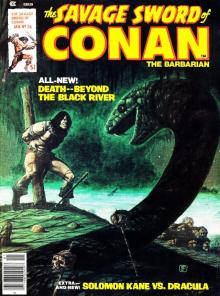 Beyond the Black River
Beyond the Black River Gods of the North
Gods of the North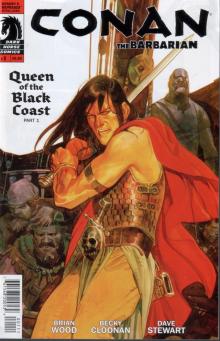 Queen of the Black Coast
Queen of the Black Coast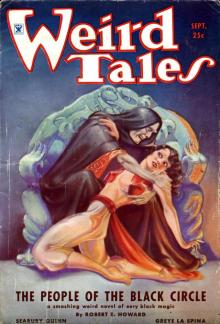 The People of the Black Circle
The People of the Black Circle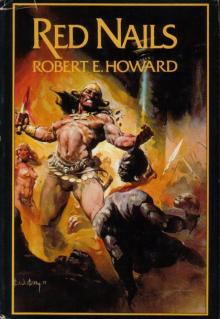 Red Nails
Red Nails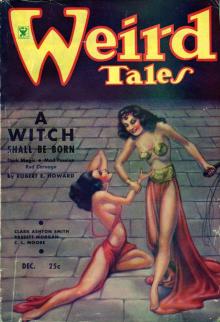 A Witch Shall Be Born
A Witch Shall Be Born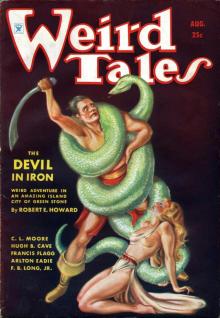 The Devil in Iron
The Devil in Iron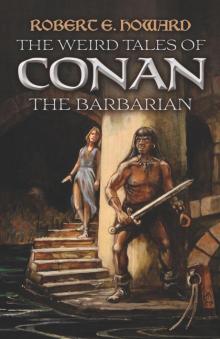 The Weird Tales of Conan the Barbarian
The Weird Tales of Conan the Barbarian The Bloody Crown of Conan
The Bloody Crown of Conan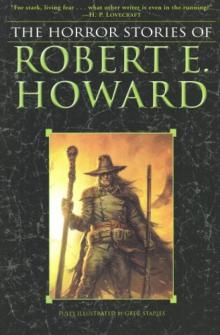 The Horror Stories of Robert E. Howard
The Horror Stories of Robert E. Howard Conan the Conqueror
Conan the Conqueror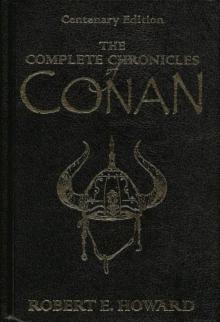 Conan the Barbarian
Conan the Barbarian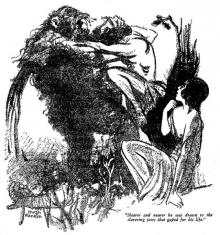 Shadows in the Moonlight
Shadows in the Moonlight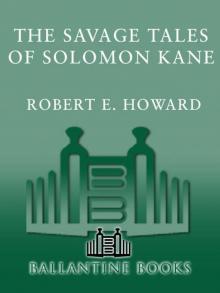 The Savage Tales of Solomon Kane
The Savage Tales of Solomon Kane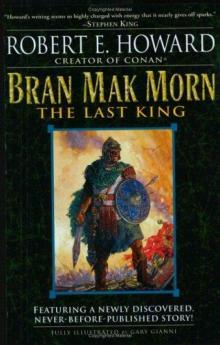 Bran Mak Morn: The Last King
Bran Mak Morn: The Last King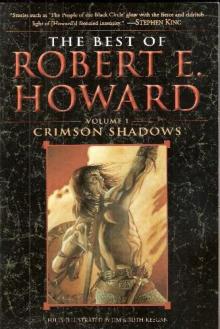 The Best of Robert E. Howard Volume One: Crimson Shadows
The Best of Robert E. Howard Volume One: Crimson Shadows The Best of Robert E. Howard: Crimson Shadows (Volume 1)
The Best of Robert E. Howard: Crimson Shadows (Volume 1) Black Hounds of Death
Black Hounds of Death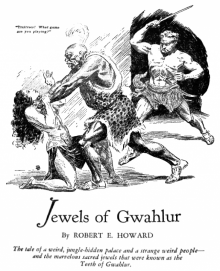 Jewels of Gwahlur
Jewels of Gwahlur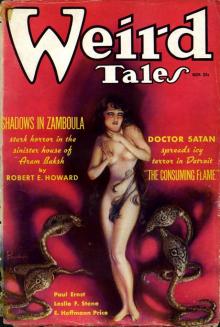 Shadows in Zamboula
Shadows in Zamboula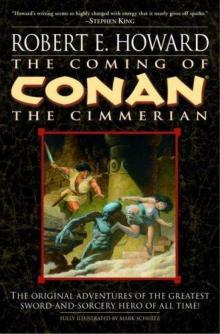 The Coming of Conan the Cimmerian
The Coming of Conan the Cimmerian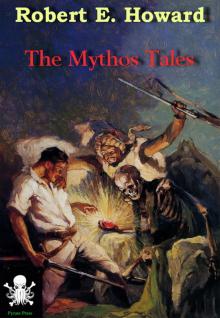 The Mythos Tales
The Mythos Tales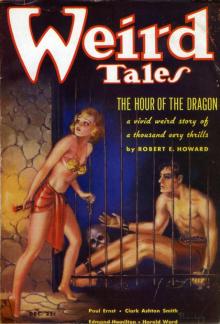 The Hour of the Dragon
The Hour of the Dragon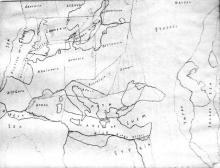 The Hyborian Age
The Hyborian Age El Borak and Other Desert Adventures
El Borak and Other Desert Adventures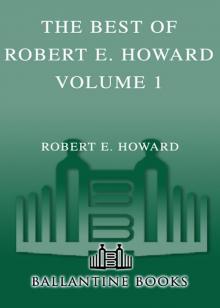 The Best of Robert E. Howard Volume 1 The Best of Robert E. Howard Volume 1
The Best of Robert E. Howard Volume 1 The Best of Robert E. Howard Volume 1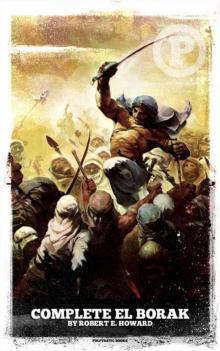 El Borak: The Complete Tales
El Borak: The Complete Tales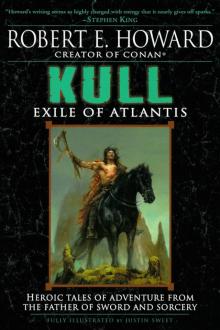 Kull: Exile of Atlantis
Kull: Exile of Atlantis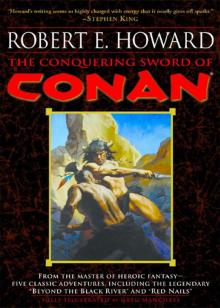 The Conquering Sword of Conan
The Conquering Sword of Conan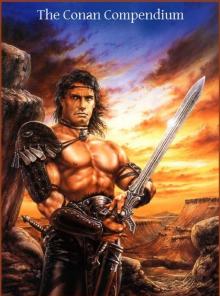 The Conan Compendium
The Conan Compendium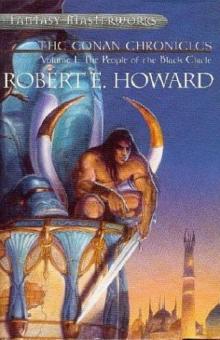 The Conan Chronicles: Volume 1: The People of the Black Circle
The Conan Chronicles: Volume 1: The People of the Black Circle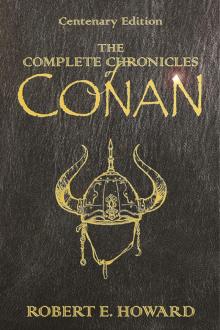 The Complete Chronicles of Conan: Centenary Edition
The Complete Chronicles of Conan: Centenary Edition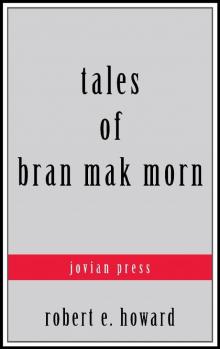 Tales of Bran Mak Morn (Serapis Classics)
Tales of Bran Mak Morn (Serapis Classics)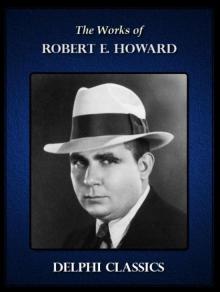 Delphi Works of Robert E. Howard (Illustrated) (Series Four)
Delphi Works of Robert E. Howard (Illustrated) (Series Four) Conan the Barbarian: The Stories That Inspired the Movie
Conan the Barbarian: The Stories That Inspired the Movie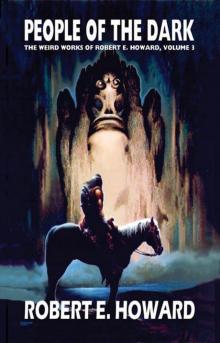 People of the Dark Robert Ervin Howard
People of the Dark Robert Ervin Howard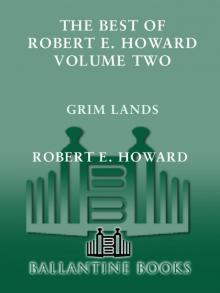 Grim Lands
Grim Lands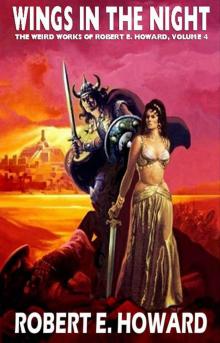 Wings in the Night
Wings in the Night Gardens of Fear
Gardens of Fear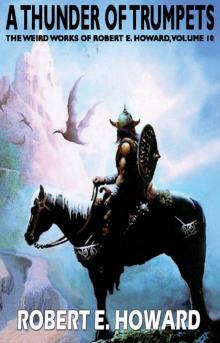 A Thunder of Trumpets
A Thunder of Trumpets Detective of the Occult
Detective of the Occult Sword Woman and Other Historical Adventures
Sword Woman and Other Historical Adventures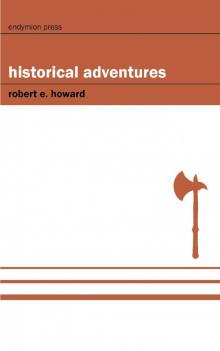 Historical Adventures
Historical Adventures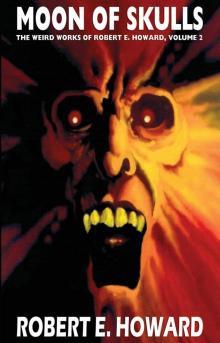 Moon of Skulls
Moon of Skulls The Robert E. Howard Omnibus: 97 Collected Stories
The Robert E. Howard Omnibus: 97 Collected Stories The Pirate Story Megapack: 25 Classic and Modern Tales
The Pirate Story Megapack: 25 Classic and Modern Tales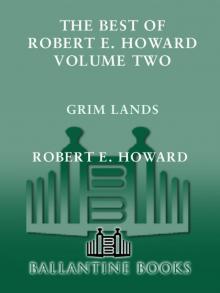 The Best of Robert E. Howard, Volume 2
The Best of Robert E. Howard, Volume 2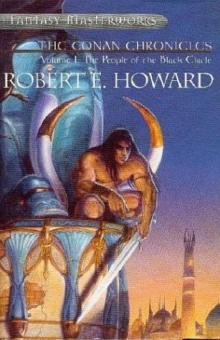 The Conan Chronicles, Vol. 1: The People of the Black Circle
The Conan Chronicles, Vol. 1: The People of the Black Circle Sword Woman and Other Historical Adventures M
Sword Woman and Other Historical Adventures M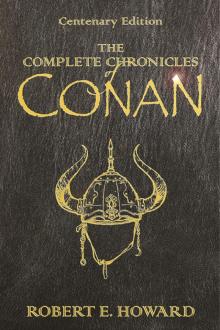 The Complete Chronicles of Conan
The Complete Chronicles of Conan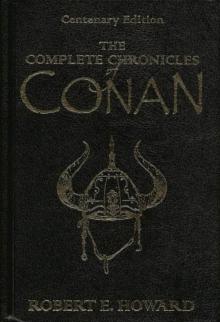 Conan the Barbarian: The Chronicles of Conan (collected short stories)
Conan the Barbarian: The Chronicles of Conan (collected short stories) The Conan the Barbarian Stories
The Conan the Barbarian Stories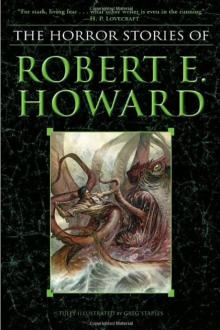 The Best Horror Stories of
The Best Horror Stories of Tigers Of The Sea cma-4
Tigers Of The Sea cma-4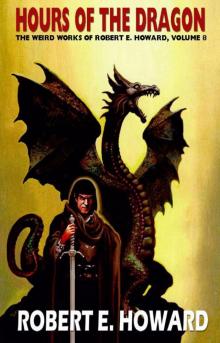 The Hours of the Dragon
The Hours of the Dragon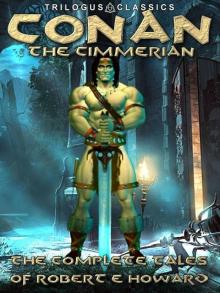 Conan the Cimmerian: The Complete Tales (Trilogus Classics)
Conan the Cimmerian: The Complete Tales (Trilogus Classics) Collected Western Stories of Robert E. Howard (Unexpurgated Edition) (Halcyon Classics)
Collected Western Stories of Robert E. Howard (Unexpurgated Edition) (Halcyon Classics)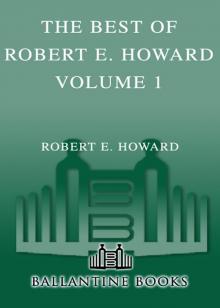 The Best of Robert E. Howard, Volume 1
The Best of Robert E. Howard, Volume 1 Shadow Kingdoms
Shadow Kingdoms